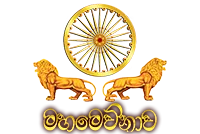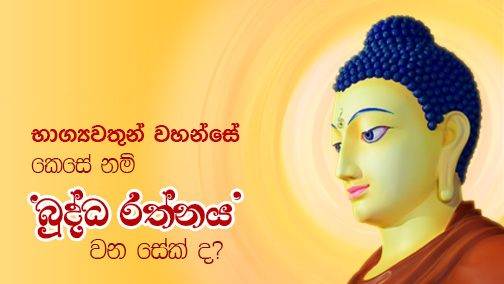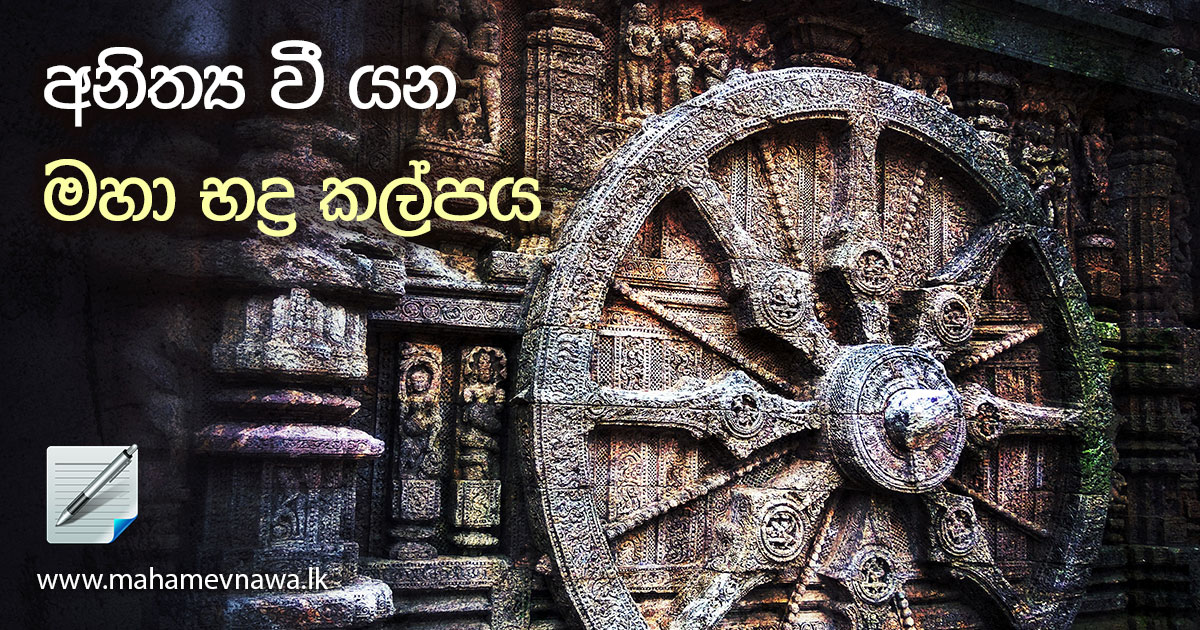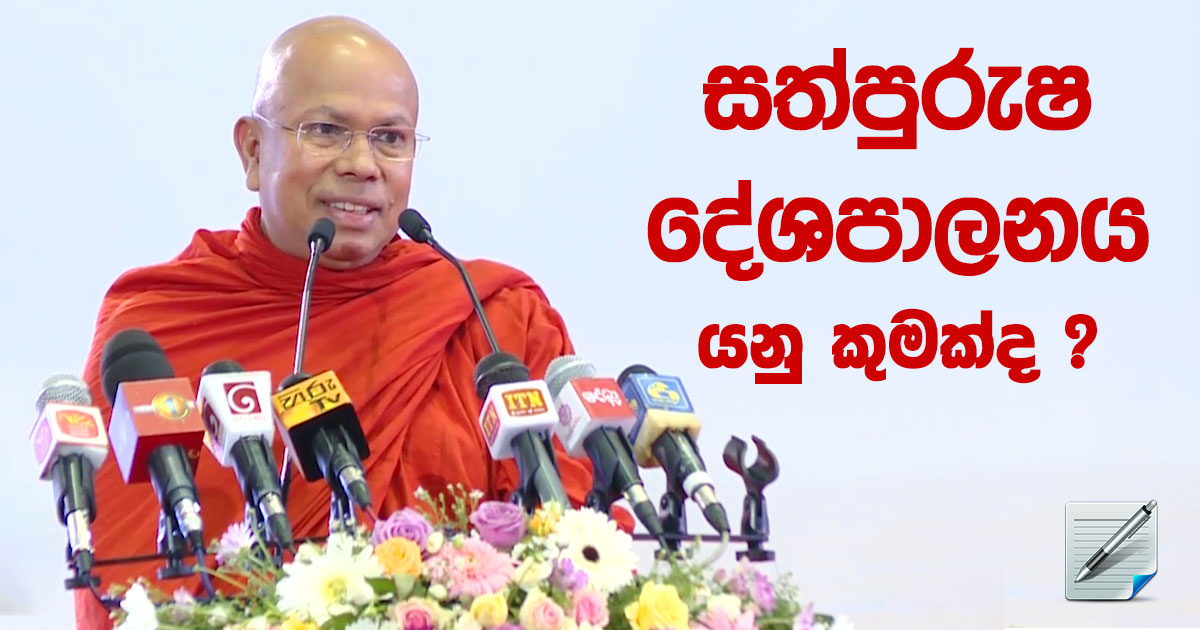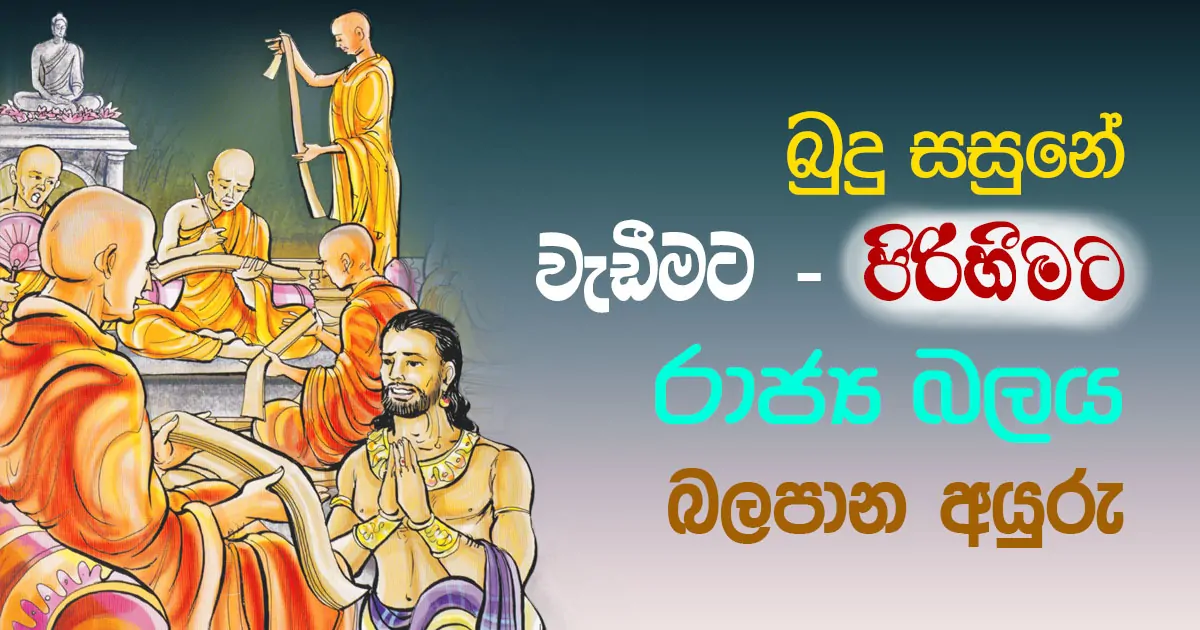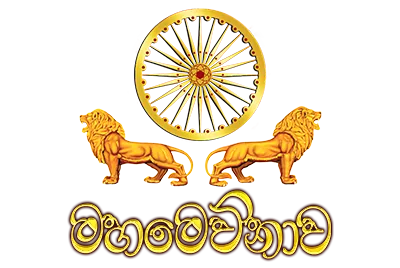Though, he felt happy after I told him that “we are the disciples of the Supreme Buddha,” and that we came bearing the message of the Buddhism. With a compassionate heart, we came to share the teachings of the Gautama Buddha with you all. After introducing ourselves to the king, I asked him the famous question regarding the mango tree/fruit to check his capability of understanding a profound teaching like the Buddhism. It was really amazing how he answered those questions correctly. In fact, we also saw how wise the rest of the people related to the royal family. After we met them and taught them our great teacher’s discourses, I felt happy about the wisdom they inherited.
I still feel a great joy when I think of how the King Devana Patis and his loyal ministers became determined Buddhists by realizing the true meaning of one of the Buddha’s teachings where the foot of an elephant was used as an example. It is unforgettable how your ancestors’ interest on the teachings of the Lord Buddha was. When I taught them the Buddha’s discourses one by one, they listened to it happily and tried to correlate the Dhamma into their lives. I can also remember how the delicate ladies of the palace gathered to listen to those discourses sat behind the elephants without any hesitation. They were so humble towards the Dhamma and also wise and talented and attained Magaphala (entering the noble eight-fold path in four different steps towards the Nibbana (magga) or the attainment of the Four Noble Truths at the four different stages, fruitions (phala)) with no sweat at all. Next, it was the time to sermonize the general public. Since there was a large number of people gathered, inside the stable of elephants were prepared for this occasion. When they were taught about the presence of Divya Vimana (divine abodes) using Vimanavatthu and the presence of Preta Vimana (abodes of beings like demons) using Pretavatthu, they were frightened about not knowing the Noble Truths and the journey ahead of them in the dangerous Samsara. However, the words of the Buddha gave them the hope and most of all the wisdom helping them to realize the Noble Truths. They started rapidly to step into states of Magaphala by thousands.
My father, King Dharmashoka, loved this pleasant island of yours very much. He was delighted when my sister Arahant Saghamit Bhikkhuni brought a sapling of Maha Bōdhi Tree, which provided with shade to the Siddhartha Gautama in his attainment of the Buddhahood, to Sri Lanka in a procession with great respect. Since when he first heard about prophecy of the Buddha on the establishment of the Buddhism in this attractive island located in south of India, he started to extend his great affection to this pretty island. On that day of bringing the Maha Bōdhi Tree sapling to the seaport of Dabhakola in a procession under the worship of many deities including Dēva, Nā, and Brahma, King Devana Patis received it with immense respect and love. The thrilled king worshiped the Maha Bōdhi Tree sapling with the greatest gift a king can afford; he bestowed his kingdom in the name of the Gautama Buddha. Not even the earth could bear the happiness. It shook three times as to greet the worship (Sadu Sadu Sadu). While this is being done, the road from Dabhakola port to the compound in Anuradhapura where the Bōdhi Tree was to be planted was decorated with white, soft sand and with colorful orange trees and vases along the sideways of the road. The procession was taken place under a pouring rain of different types of beautiful flowers on a Vesak Poya day. It was a distinct moment for everyone who gathered to participate this special occasion. Once again, the earth felt this devout moment. When the Bōdhi Tree was planted on the Maha Bōdhi compound, the mother earth paid another respect by making the sound of adoration (Sadu) three more times.
According to my father’s guidance, the Maha Bōdhi Tree sapling was respected and worshiped with coronation in India prior to its journey to Sri Lanka. When the tree was settled in the compound in Anuradhapura in your island, the sapling was respected by a similar coronation ceremony in Sri Lanka by the royal family. The Bōdhi Tree was decorated elegantly and worshipped with the royal ornaments and the crown. The Maha Bōdhi Tree sapling was planted and treated with the water brought from the Lake Anawatap by Kshattriya virgins. Maha Bōdhi Tree sapling became the “Bōdhi Raja” of this island since the coronation ceremony performed by the King Devana Patis. Another remarkable incident happened on that day: the King Devana Patis protected the Bōdhi Tree sapling by disguising as a security guard until the homage to the great sapling was completed. Afterwards, the king wore the royal ornaments and the crown, and he came forward and offered his kingdom to the miraculous sapling of Maha Bōdhi Tree admirably. Even at that time, the mother earth trembled performing the reverence for another time.
My dear children, the youth of your esteemed clan were wonderful. Preceded by the young Arittha, a lot of young people joined the Kingdom of the Gautama Buddha in a count of hundreds and thousands. These young people were extraordinarily fortunate to attain the Arahantship (attainment of Nibbana) and became the disciples (sons) who were born in the defilement-free pure heart of the Gautama Buddha. They were also fortunate to convoke the Discipline part of the Buddha’s teachings at a later time period of your history. This convocation was carried out in the compound of the Thūparama Stūpa. At the time when this great convocation was taking place, the mother earth paid another respect. Even though I bore the Dhamma in Magadhi or Pāli language, I delivered it to you in your own language. Then, I taught the young Buddhist pupils the Buddha’s teachings in Pāli exactly as I learnt them without any alteration. They bore it enthusiastically in their hearts like a bunch of thirsty deer drinking cool water to quench their thirst. Their heartfelt respect towards the Dhamma was tremendous. When I explained the meanings of the Dhamma discourses in Sinhala, they bore it in their hearts without any doubt. They tried hard to protect the Buddhism for the wellbeing of humans and deities. I taught them the untainted teachings of the Gautama Buddha. Those teachings did not include any of the corrupted current versions such as Mahayana of wishing the Buddha-hood nor the worshiping of the Bōdhisatta. These current ways are not the true teachings of the Buddha, and they are diverted from the true path towards ending the suffering of being born in the Samsara. What I taught was the untainted teachings of the Gautama Buddha. The only expectation of those teachings was to show the disciples the way to be protected by been born only within Sugati (good) worlds (deities and humans), and finally to put an end to the Samsara. That is the true Buddhism…
My dear sons and daughters, the potential of your past young generation was not inferior to that of the fortunate people of India at that time. That was the reason why I never left this island until the day I passed away. It was also the same reason to why my father, King Dharmashoka, was reborn here as Kudutis Maha Thero and further developed the existence of the Buddhism in this country. This attractive island became rich in every way when the government and the general public lived according to the Dhamma by suppressing the evil deeds. It was prosperous with food and became famous as the ‘the pearl of the Indian ocean.’ Most of all, it became more venerated than India where the Gautama Buddha’s Maha Bodhi Tree was located. Sri Lanka was also known as “the Island of Dhamma” in that great era.
Dear children, this island was abundant with gold, silver, pearls, and gems at those times. One greedy Chōla king from the Sothern part of India wanted this treasure to him and invaded the country like a bunch of demons that possessed a precious lake with various rare flowers. At the end, however, there was nothing else even for them to do other than becoming disciples of the Buddha. My sole intention though was to make a Sri Lankan generation of Buddhist disciples capable of protecting and spreading the great teacher’s Dhamma around the world. If Chōla clan needed the Buddhism to be established in their country, then they could also take the Dhamma from Sri Lanka to brighten Chōla’s land. In fact, that was what happened. At that time period, the Sothern India was flourished with the Dhamma and brightened by countless Arahants (disciples who attained the Nibbana).
My dear children, sustaining the teachings of our great teacher, the utmost leader of the world (Lōka Natha), in its pure form became difficult because of some sinful monks who were born within the Buddha Sasana (the Kingdom of the Buddha). Every Buddhist monk asks for monkhood at the beginning with an intention of attaining Nibbana: “please ordain me in following the path to eradicate all my defilements and witness the attainment of the great Nibbana.” Unfortunately some of them forget the sole purpose of becoming Buddhist monks as the time passes by. Their priorities change. They turned into a menace to the existence of the Buddhism in its true form. This was when one of the great disciples of the Buddha, Mahākashapa Arahant Thero, saw this unfortunate event of contaminating the Buddha’s words by these monks. Upon Mahākashapa Arahant Thero’s interceding, the first great convocation was performed to establish Buddha’s words in its correct form again. However, my dear children, it was not long before the sinful monks rose again and started contaminating the discipline taught by the Buddha within the next hundred years. This was why our great meritorious monks had to perform the second convocation to purify the Buddha’s word once again by protecting it from dishonorable monks born within the Sasana.
Merited children, the monks in the Gautama Buddha Sasana can be divided into several parts. One part of monks practiced Dhamma and brightened it by realizing the Four Noble Truths. Another part of monks did not practice Dhamma, but fed from it. Another part of monks, even being fed from it, started manipulating the true words of the Buddha by including their own thoughts without any fear or respect to the great teacher. Then, there was another part of monks who defaced the words of the Buddha completely by posing suspicious points of the path to the Nibbana. Thus, the third great convocation was taken place rejecting those worthless viewpoints to protect the chance of joining the Buddha Sasana for the future generations. This was done under the supervision of my mentor, Venerable Moggaleeputtatissa Thero, and my father (King Ashoka).
Children, I used to closely associate the monk in Chētiyagiriya when I was the heir to the throne in the city of Udeni. This association helped me to understand the danger of this Samsara and to relinquish the desire in becoming a king. Since I heard about some former kings ruling for a short time of period and became victims of suffering in evil births like in hell, my mind gave up the desire to be a king and surrendered to the Buddha Sasana. This was when my father summoned me to Palalup city and asked if I like to become a monk: “dear son, are you interested on attaining Magaphala by becoming a disciple of our great teacher?” I felt extremely happy the moment he asked me that question. “How fascinating the ways of a monk… What a freedom a monk is experiencing… When can I become one of them and go for collecting alms…?” Before my father asked me that question, I used to dream about the time I enter the monkhood and rejoice the pleasure of becoming a monk. I lived in that thought with an extreme happiness beholding the sight of the calm and ascetic monk who lives a charm live just with three robes and a bowl. I wanted to become a monk with that tranquil mind, which cannot be achieved by enjoying the drinks and women in the royal palace… As soon as my father asked me about becoming a monk, I bent on my knees in front of him. “Oh! My lord King, I really like it. The pleasure one will gain by becoming a king is inferior to even one-twelfth of the tremendous happiness that I will get from the Buddha’s teachings.” My father started to shed tears and hugged me saying “my loving son, it is indeed a great fortune. Go become a disciple of the Buddha. Learn the great Dhamma and see it through your life. Bring it closer to your heart. Realize the true meaning of it and attain the great Nibbana. Become a great disciple and live a great life for the wellbeing of humans and deities.”
My dear children, thus, I became a disciple of the Gautama Buddha. I could finish studying and remembering the complete collection of discourses of the Buddha after three years from my ordination at Ashōkarama in Palalup city. I could also memorize the stories behind those discourses. Then, I came to your island bearing the pure Buddhism I learnt. When the generation of monks who I made tried to protect the true ways of the Buddhist monkhood after becoming pupils of the Buddha, the other part of the monks who used to practice the Buddhism in their own stubborn ways and who were thrown away from the third great convocation rose up again and gave a catastrophic blow to the Buddhism. The plan of these shortsighted monks was to throw away the wholesome disciple monks. For this purpose, they translated the Dhamma into Sanskrit. They rejected the true teachings of the Buddha by condemning the main goal, attaining the Magaphala, of the true Buddhism. They started the Bodhisatta worship making the attainment of the Buddha-hood as their primary aim. The names of their false Budhisattas were countless.
At the time of this disaster happened, only the Brahmins’ Veda was written in Veda and Sanskrit languages. Brahmins never thought of other religions as a threat to their own since Veda was the only religious script written in Sanskrit. However, they were frightened after the translation of the corrupted version of the Dhamma (Mahayana) based on the worship of Bodhisatta into Sanskrit by the falsified monks who were thrown away from Buddha Sasana. After reading this translation, Brahmins started to argue pointing out its content. In an effort of defeating these Brahmins, monks of the Mahayana built large universities like Nalanda aiming to learn Veda. These dishonest monks tried not just to become equal with the Brahmins, but also to make their beliefs famous. The main language that used to learn Veda and Mahayana in these universities was Sanskrit. Furthermore, these false pupils started witchcraft to match miracles that the Brahmins performed by practicing different types of severe ascetic ways. They also invented various theories suitable to make a stand against arguments of the opposite side. They rejected the Buddha’s word indicated in the Alagaddūpama Sutta, which states that “if anyone tries to learn my teachings to argue with others, then he will be destroyed like the man who destroyed himself by trying to catch a snake from its tail.”
When these falsified monks won those arguments, they enjoyed making the Brahmins their servants in Nalanda University. These arguments were taken place in extreme manner and resulted even in killing the monks when Brahmins won their arguments. Mahayana monks further argued and condemned the concepts of the true Buddhism, and they made sure of the disappearance of the true teachings of the Buddha from face of the India. Mahayana was spread throughout the India like a large bunch of crows covering a huge tree. These monks pretended to be Bodhisatta, but their actions devastated the existence of the untainted Buddhism leaving the Indian people nothing but some falsified concepts that they built by themselves. On the other hand, the Brahmins were angry at these monks because of the change that they have made to the Brahmin society. They were also despiteful on these monks’ spiritual capabilities. Then, it was not long when an extremist Sothern Indian Brahmin called Sankarāchārya rose up and destroyed their power. By the time a theism called Musālman, which was seen for over several hundred years, was in its climax and was trying to invade India, the Brahmins supported them to first destroy Buddhism, or at least what was left of it: “Hey Musālmans, you need to first destroy the dangerous force of monks with yellow robes if you are to invade this country. You need to wipe out places like Nalanda University where they learn various philosophies and witchcrafts.” When these extremists heard these words, they became hectic with their concept of theism. With the help of the forces of Mara, these men became fiercely agitated and swept out the entire legion of false monks from India. This was how the Buddhism completely vanished from India. However, Brahmins did not overcome their fear towards the Buddhism. They saw a pearl in the Indian Ocean where Buddhism was being brightened in its pure form. They saw this as a future threat to their Veda and thought to destroy this island as well. As a result of their evil intention, the devotees of god Siva made up a fiction known as Ramayana. The Sothern Indian Brahmins converted all Buddhist monks in India keenly and slowly and also converted the temples into premises for Siva devotees with the help of this fiction. Ramayana was frequently recited in these places. Even the rulers of India were influenced by the story in Ramayana. They believed the story about a Sri Lankan king known as Ravana who kidnapped the wife (Seeta) of their god Rama. It also included a fake story about how their god Rama killed king Ravana. This story further prompted the Indian kings to show their evil power by invading Sri Lanka. They wanted be like their god Rama. They made a false impression about Sri Lanka making their rulers to believe that this Dharmadweepa (Island of Dhamma) as an island full of evils. Kālingamāgha, who believed these false accusations about Sri Lanka, destroyed most of temples and Stūpas by firing them. With a combination of worshiping of Siva, which was gifted from Persia, and a part of worldly worships of a sect of Mahamayana, Indian people started to worship the gender organ of Siva.
However, my dear children, a spirited king named First Vijayabāhu who was born in South part of Sri Lanka saved the island with great effort by making the words (the prophecy) of the Buddha become true. Also, the King Parakramabāhu reformed the Buddha Sasana, which was tormented by Kālingamāgha’s attack. Though, it was too late to permanently cure the people who inherited a blood line from Shakyan clan from Palalup City of India. By that time, both the Buddha Sasana and people around it were becoming weak gradually. Dear children, the theistic Musālmans demolished the entire Buddhist community including the monks from your neighboring country, Maldives, and established their religion in these countries. In this pleasant country (Sri Lanka), your ancestors became the victims of theism of the western extremists before that of the Musālmans’. There were incidents in which some monks were disappeared without even knowing what happened to them. Moreover, the pure Buddhist concepts were mangled since the intrusion of Mahayana ideas into the Buddhism from time to time. These distorted ideas weakened a disciple’s fear to be in the Samsara. The people have become credulous towards other believes and feeble as the power of the country’s government and the Dhamma became weak. I felt heartbroken when I saw this dissipation of the Buddha Sasana’s great generation that I made with a great effort to protect and brighten the teachings of the Buddha.
When a world full of lunacy of sensuous lust and deception was created based on science nurtured by theism, the Dhamma was beaten and moved aside by prohibiting the young people to practice it. The large rip between the truth and deception in such a world was incomprehensible to the general population. As a result, practicing the Dhamma was misconceived as a shy and sinful action. It was not even allowed to think about it. After building a stern background powered by these false views, they spread the message of love like a tsunami victimizing everyone who comes in between it and the lunacy of sensuous lust. The self-esteem and virtue gained from the Buddha Sasana was slipped away from young people. Dear children, please look at the advices that are in this Akālika (suitable for any period of time) Dhamma. Do you remember the four evil extremes that the Lord Buddha taught to the Sighālaka children? The Buddha taught us not to become victims of those four items: the conformity towards defilements (Chanda), hatred, fear, and lack of the realization of the Four Noble Truths (Mōha). Please do not degrade yourself by accepting these evil extremes.
Also, there are six things that will bring you great suffering if you allow them to accompany you. Those six things are: use of alcoholic substances, go out at night (and involve in sinful acts), waste your money on lustful entertainments, participate in gambling, make evil friendships, and spend time lazily. Dear children, our great teacher asked us not to dwell in these bad habits since they bring suffering to your life.
Dear children, please be a true friend who would not deceit his friend to get something from him by becoming an evil friend (Agngnadatthuhara). A true friend does not waste his friend’s time by talking rubbish (a Vacheeparama friend). A true friend is not someone (Anuppiyabhānhi) who supports his friend in participating doing bad deeds or good deeds just to save his friendship, and who speaks his friend’s qualities in front of him and defame his character when he is not present. A true friend becomes happy when he sees his friend be reborn in Sugati worlds and not in bad worlds like in hell or among animals. Therefore, a true friend is not someone (Apāya Sahayaka) who puts his friend in a state of promoting bad deeds just to take advantage from the moment and prompting him performing bad Karma that will ultimately cause him to be born in evil worlds.
Dear children, be a good friend (Kalanha Mittra) who always protects his friend from any misguided actions. He makes him build a good character full of virtue. He frees his friend from the danger and prevents him from immoral deeds. He will also try making his fiend listen to the Dhamma that he never heard before. Thus, he will put him to the track that leads to Sugati worlds. The true friend does not enjoy his friend’s dissipation, instead he enjoys when his friend develops his moral qualities. He will not allow others to insult his friend. He will show them his good qualities.
Dear children, the six directions (east, south, west, north, up, and down) have their own meanings for a virtuous child. The east, south, west, and north directions represent his parents, teachers, family, and friends, respectively. The down and up directions represent his servants and the noble monks, respectively.
Dear children, please do not ever become a traitor to your teachers who help you enter the path of the Dhamma and tries to discipline you in it. They introduced you to esteemed people and to the community. Therefore, practice to stand up and respect your teachers when they are around. Help and treat them when they are in need of help. Learn what they teach you well and be polite and respectful towards them.
Dear children, the Supreme Buddha helped you not only to attain Nibbana, but also to ease your suffering in this journey of the cruel Samsara by showing you the correct path to be born in Sugati worlds. He showed us the path to Nibbana and to get reborn in these good worlds because He held the most compassionate heart, and He was the only true teacher who saw the world in its exact form. Dear children, do not get trapped in today’s irrelevant things such as becoming victims of the bogus worldly lunacy of Valentine. Become a disciple of the Gautama Buddha and embrace Him as your great teacher from your whole heart. Realization of the world’s truth using the mirror of Dhamma is a tremendous legacy of everyone who likes the truth. I am writing this because I spent my whole life in comforting your ancestry by introducing the Gautama Buddha’s teachings to this pleasant island. I wish you the best in opening your mind to the truth and in realizing the true path beyond the deceiving sights of the modern world…
This is Mihindu Thero addressing you from Nivan Pura…!
By Ven. Kiribathgoda Gnanananda Thero
